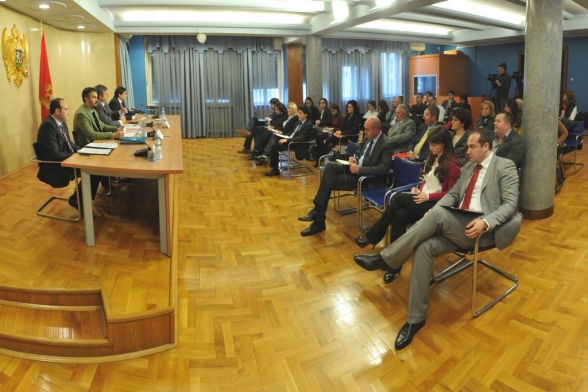At the public debate of the Committee on European Integration held today, and moderated by the Chairperson of the Committee Mr Slaven Radunović, the panellists were: Mr Aleksandar Andrija Pejović, State Secretary for European Integration and Chief Negotiator for Leading Negotiations on Montenegro's EU Accession; Mr Nikola Fabris, Vice Governor for Financial Stability and Payment Systems of the Central Bank of Montenegro and Negotiator for Chapter 4; and Mr Dragan Radanović, Manager at the Section for Cooperation and Assistance of the European Union Delegation to Montenegro.
Free movement of capital covered in Negotiation Chapter 4 was, as it was emphasised, one of the four economic liberties representing a foundation of the Single Market of the European Union. It was pointed out that this field covered three segments: free movement of capital and payments, payment services and prevention of money laundering and funding of terrorism. The significance of free movement of capital was highlighted at the debate, in sense of benefits that it could bring to the citizens and business enterprises by applying necessary harmonisation and establishment of a good normative framework. Furthermore, it was pointed out that the free movement of capital was unique because it also related to the movement of capital between the EU member states and third countries.
As a very significant segment of this chapter, the connection of a part of the Chapter 4 relating to money laundering and funding of terrorism with Chapters 23 and 24 in part of effective fight against corruption and organised crime was highlighted. The legislative framework was, as the panellists said, to a great extent harmonised with the EU legislation, with the note that with expiration of SAA certain laws would undergo changes, such as the one dealing with the issue of liberalisation of real estate trade for the EU citizens under the same terms as for the citizens of Montenegro.
The members of the Working Group, representatives of the media, NGOs, banks and other interested institutions, attended the public debate. On this occasion, the participants expressed interest in the issues of restitution pointing out that there was a significant number of unsolved cases that had been waiting for epilogue for a number of years. Furthermore, they also spoke of introducing the PayPal system, having in mind that the Chapter 4 covered this field as well. With that regard, they said that Montenegro did not have any legal obstacles to join this system, but that they were waiting for an invitation from the PayPal company, which had not shown interest in the Montenegrin market so far.









